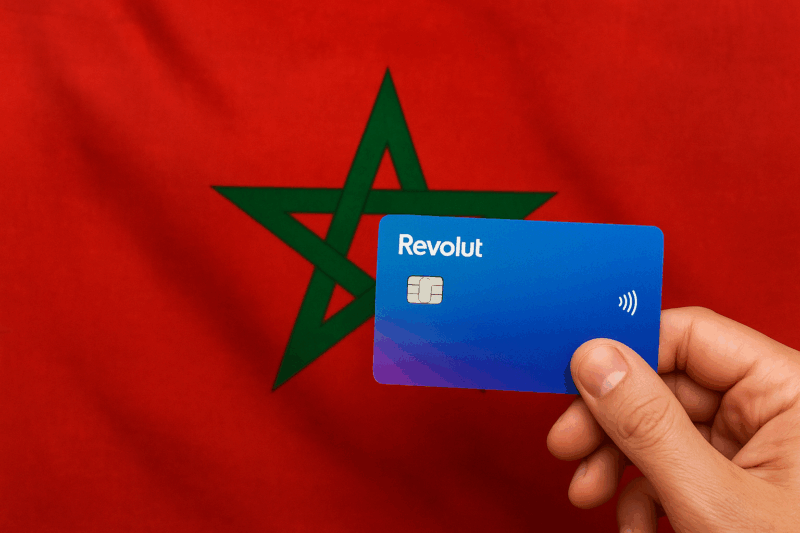Europe’s largest digital bank, Revolut, is taking concrete steps to enter the Moroccan market. According to local news sources, the fintech has already submitted a request for regulatory approval to Bank Al-Maghrib (Morocco’s Central Bank) and is now in recruitment mode to build its local team.
In July, the company appointed Amine Berrada, former operations director for Uber in Southern and Eastern Europe, as general manager for Morocco.
Founded in 2015, the fintech has grown into a global fintech powerhouse with nearly 60 million users worldwide, a valuation above $40 billion, and more than $1 trillion in annual transaction volume. Its expansion strategy targets high-growth markets across the Middle East and North Africa, including the UAE, Saudi Arabia, and now Morocco.
Much of the commentary on Revolut’s Moroccan ambitions has centred on remittances, a logical target given Morocco’s 5 million-strong diaspora. But another equally compelling factor stands out: tourism.
Morocco: Africa’s tourism leader
Morocco’s tourism sector is booming.
Last year, the country welcomed 17.4 million visitors, overtaking Egypt as Africa’s most visited destination, with revenues hitting $12.4 billion. This growth stems from foreign tourists (8.8 million, +23%) and Moroccan expatriates (8.6 million, +17%) returning home.
The momentum has been carried into 2025.
By the end of July, Morocco had already welcomed 11.6 million tourists, up 16% year-on-year. According to the Ministry of Tourism, Handicrafts and Social and Solidarity Economy. With the 2025 Africa Cup of Nations and the 2030 FIFA World Cup (co-hosted with Spain and Portugal) on the horizon, inbound flows are expected to accelerate further.
These figures underpin why Morocco is a natural fit for the fintech’s expansion. Its largest customer base is in Europe, particularly in France, Spain, the UK, Germany, and Italy, the very countries that send millions of tourists to Morocco each year.

Tourism: following the user
For many Europeans, Revolut is already the go-to travel money app. The appeal is simple: real exchange rates, low fees, and multi-currency wallets. When these customers travel to Marrakech, Agadir, or Casablanca, they expect the same frictionless experience.
But today, using Revolut in Morocco can be less smooth. Issues such as patchy merchant acceptance, local banking limitations, and higher fees sometimes frustrate users. Once a local presence is established, Revolut can resolve these frictions, ensuring wider acceptance, better rates, and faster support.
For Revolut, the benefits are immediate.
Tourists are high-frequency, high-spend users: paying for hotels, restaurants, tours, and shopping. Each transaction generates interchange fees, while FX conversions add further revenue.
Thus, Morocco’s massive inbound tourism represents low-hanging fruit, allowing Revolut to start strong without needing to dislodge entrenched domestic players.
Revolut could use tourism as a brand builder
There is also a reputational benefit. Tourists using Revolut in Morocco introduce the brand to local merchants and residents. Hotels, riads, and restaurants catering to international visitors may be among the first to adopt Revolut-friendly payment solutions.
Over time, this builds local credibility, smoothing the fintech’s eventual expansion into domestic financial services and remittances.
Consider the case of a French tourist landing in Marrakech. Instead of dealing with exchange bureaus at the airport or paying hefty fees on traditional bank cards, they can continue using the neo-bank’s products at local hotels, restaurants, and shops.
The app’s instant notifications and spending analytics also give tourists a sense of control over their expenses abroad.
By embedding itself into this experience, the company strengthens its value proposition for both casual holidaymakers and frequent travellers. In this sense, tourism acts as a bridge market, helping Revolut localise gradually while leveraging its global base.


Revolut could face regulatory and structural hurdles in Morocco
Yet the neo-bank’s entry will not be straightforward. Bank Al-Maghrib has not issued a new foreign banking license in over a decade, reflecting its cautious and stability-first approach. This has already frustrated other fintech hopefuls such as Kenya’s M-PESA and Nigerian payment unicorn, Flutterwave.
The bigger obstacle may be the Office des Changes (the foreign exchange office), which strictly enforces Morocco’s capital controls. Outbound international transfers by residents are capped at an annual “tourist allowance” of MAD 100,000 (about $10,000). This clashes with Revolut’s core value proposition, seamless, user-initiated global transfers.
Online forums show scepticism: “There is no way the app will be allowed to transfer money abroad, otherwise it won’t be licensed,” one user warned. The consensus is that Revolut will excel at receiving foreign payments and supporting domestic digital transactions, but outbound flows will remain heavily restricted.
The likely outcome is a localised, limited version of Revolut, optimised for inbound payments and tourism-driven transactions, rather than full global interoperability.
Implications for Morocco’s fintech sector
For Morocco, the neobank’s arrival could be a catalyst for accelerating digital payments adoption, especially in the tourism sector. Local businesses catering to foreign visitors may see increased sales by accepting Revolut payments, while the overall customer experience for tourists improves.
There is also potential for knowledge transfer and competition-driven innovation. With Revolut in the mix, Moroccan banks and fintechs may be pushed to improve their digital offerings, ultimately benefiting consumers.
So, even if Revolut clears the regulatory hurdles, it will face stiff competition. Cash Plus, founded in 2004, has grown into Morocco’s leading non-bank financial services provider with 8,000 branches, twice as many as its nearest banking competitor.


The company processed over MAD 100bn (~$10bn) in 2023 and is undergoing an aggressive digital transformation. Its M-Wallet app already serves over 1 million users, backed by a €57m investment from Mediterrania Capital Partners, FMO, and IFC.
In a clever preemptive move, Cash Plus now allows non-residents to open accounts with just a passport, a direct nod to Morocco’s tourism surge and foreign inflows.
As Nabil Amar, Chair of the Cash Plus Board, put it: “Morocco is on the global radar, and fintech is no exception. We are building infrastructure that can support both local users and international entrants, with or without a bank account.” This positioning makes Cash Plus not just a rival but a formidable gatekeeper for Revolut’s ambitions.
Revolut’s expansion into Morocco is not only about remittances or long-term digital banking disruption. It is about following its users.







